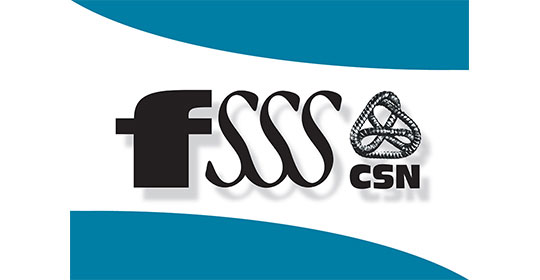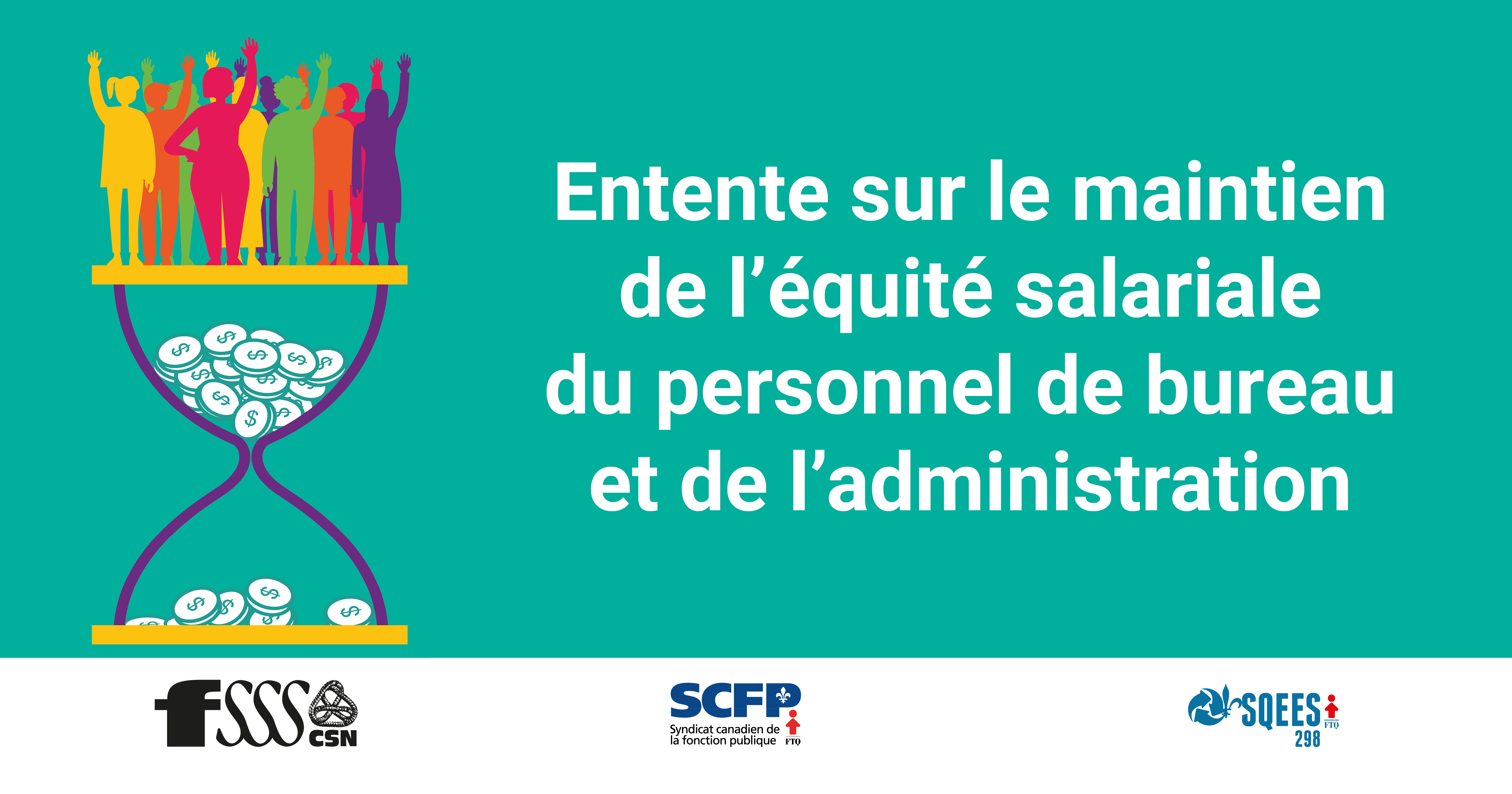When will I start getting paid at my new rate?
For the job titles covered by the pay equity settlement, i.e. Administrative Officers, Classes 1, 3 and 4, Medical Secretaries and Legal Secretaries, the new salary will be applied following the signing of the agreement on the pay equity complaints. The List of Job Titles will then be amended to include the new pay rates and scales. New salary parameters will also apply under the new collective agreement if it is ratified by the general assemblies.
For the job titles covered by the agreement on remuneration, i.e. Administrative Officers, Class 2; Assistants, University Teaching; Purchasers; and Executive Assistants, the new salary will apply when the new collective agreement is signed.
When will I receive the retroactive amounts owing?
Three job titles covered by the agreement to settle the pay equity complaints (Administrative Officer Class 1, Medical Secretary and Legal Secretary) will receive the amounts due in a single payment, with interest at the statutory rate of 5%, no later than during the pay period that includes the date October 31, 2024.
For Administrative Officers, Class 3 and 4, we cannot specify the precise date at this time, as it is linked to the CNESST decision, but interest will be added until payment is made. Further details will follow as soon as possible.
The retroactive amount you receive will be the difference between your pay for that period (not counting premiums, supplements and lump sums, including those paid as a result of ministerial orders due to the public health crisis) and what you should have received for that period under the new rates and scales.
The employer should provide you with details of the retroactive payments and interest. If not, you can contact your institution’s payroll department. If they refuse to provide the information, please contact your local union.
What is the interest rate?
The statutory interest rate is 5%. It applies to the job titles covered by the pay equity settlement—i.e. Administrative Officers, Classes 1, 3 and 4, Medical Secretaries and Legal Secretaries—starting from the retroactivity date.
The Pay Equity Act provides that if pay adjustments are not made within the prescribed time frame, interest at the statutory rate will be added, starting from the time the payments should have been made. The interest rate is determined for each pay period based on the time elapsed from the date the amount was due and the date the interest is calculated.
Will deductions be taken from the retroactive payment?
Yes, because the retroactive payment is for the salary the employee should have received since the adjustment date stipulated in the agreement. Therefore, all the usual deductions (Québec Pension Plan, Québec Parental Insurance Plan, RREGOP, EI, union dues, income tax) will be applied to the retroactive amount.
No deductions apply to the interest and employers are not required to make such deductions at source.
If I received a premium based on my pay rate and my pay is changed retroactively, will this affect the premium?
Yes, all remuneration rights and benefits set out in the collective agreement must be adjusted as though the pay rates and scales had been applied on the dates they should have been. The employer is responsible for making the retroactive adjustments.
Do employees covered by the agreement have to ask the employer to adjust their salary?
No, you don’t have to do anything. It is up to the employer to make the adjustments. However, if you don’t receive the amounts due, you must contact the employer.
Can former employees receive the retroactive payment?
Yes, employees who stopped working between the retroactivity date and the retroactive payment will have three years, under the Civil Code, to request payment from their former employer.
The employer must make payment after receiving a request in writing from the employee.
If the employee is deceased, his or her assigns (heirs) can make a request for payment to the employer.
Why do different jobs have the same ranking?
In our system, jobs are evaluated using a scoring system based on 17 factors, as stipulated in the Pay Equity Act. It is used to assess all jobs, whether predominantly female or male. Jobs are classified into 28 rankings, based on the scores they receive. Each ranking covers a range of scores. Therefore, jobs can be different and even have a different score and still be in the same ranking.
If I move up in ranking, will that affect my echelon?
No, a change in ranking does not change an employee’s echelon.
However, under the integration rules agreed to by the parties during at the time of the pay equity audit on April 2, 2019, there may be an impact on the echelon you are assigned retroactively, in accordance with the equal or immediately higher salary rule.
Why are some adjustments retroactive to December 31, 2010 and others to January 1, 2021?
For job titles covered by the pay equity process, the adjustment dates are related to the provisions of the Pay Equity Act and depend on the period for which amounts are owing, the dates of the changes that affected the value of the jobs and created a pay gap, and the date on which the complaint was filed.
What impact will the retroactive payment have on my group insurance plan?
For employees who received disability benefits, the employer must recalculate the amounts and, if there is an adjustment to be made, it must make a retroactive payment.
The employer must notify the insurance company.
What impact will the retroactive payment have on my pension plan?
For pensioners, Retraite-Québec will recalculate the pension and, if there is an adjustment to be made, it will make a retroactive payment.
Processing could take a few months after receipt of the notice from the employer. When an adjustment is made to your file, Retraite Québec will send you a notice informing you of the change.
For other participants in the government and public sector employee pension plan (RREGOP), retroactive amounts will calculated at retirement.
You don’t have to do anything; the adjustments will be forwarded by the employer.
Will the retroactive payment have an impact on the Québec Parental Insurance Plan (QPIP) benefits received during the period?
QPIP’s FAQ page gives the following answers about retroactive payments under pay equity agreements:
- I received a retroactive pay increase under the pay equity agreement. Will my benefit amount be reduced for the week I received the retroactive pay increase?
- The amount of your parental insurance benefits will not be reduced for the week in which you received the retroactive pay increase. However, you must declare that income without delay.
- l’ve received a retroactive pay increase as part as the pay equity agreement. Am I entitled to a re-evaluation of my benefit amount?
- To request a re-evaluation of your parental insurance benefit amount, first send us an amended Record of Employment. A pay statement or T4 slip, for example, cannot replace a Record of Employment.
- I received a retroactive pay increase under the pay equity agreement. How do I declare my retroactive pay increase (pay equity) under the Québec Parental Insurance Plan?
- By Internet: Access your file online and click on the “Declaration of income” tab to make the necessary change. This income must be declared for the week in which it was received.
- By telephone: Call the QPIP’s Centre de service à la clientèle, at the following numbers:
- North America (toll free): 1-888-610-7727
- Overseas: 1-418-643-7246 (charges apply)
- l’ve received a retroactive pay increase as part as the pay equity agreement. Will this amount be taken into account for benefit calculation purposes when I apply for parental insurance benefits?
- Generally, yes, if you received your retroactive pay increase (pay equity) in the 26 weeks preceding your parental insurance benefit period.
Note that the retroactive adjustments to the QPIP are currently being litigated before the Administrative Labour Tribunal.
What impact will the retroactive payment have on CNESST benefits?
The CNESST will recalculate the benefits and if there is an adjustment, it will make a retroactive payment.
You don’t have to do anything; the adjustments will be forwarded by the employer.
What if I have other questions?
For any other questions, please contact your local union.





















